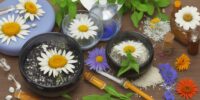What Is The Difference Between Homeopathic Remedies And Herbal Supplements?

Homeopathic remedies and herbal supplements are two popular forms of alternative medicine that are often used to promote health and well-being.
While both approaches involve the use of natural substances, they differ significantly in terms of their principles, preparation methods, and effects on the body.
Homeopathic remedies are based on the principles of like cures like and the law of minimum dose. According to homeopathy, a substance that causes symptoms in a healthy person can be used to treat similar symptoms in a sick person, but in extremely diluted form. These remedies are prepared through a process called potentization, which involves serial dilution and succussion.
On the other hand, herbal supplements rely on the use of plant-based materials, such as leaves, roots, and flowers, to support various aspects of health. Herbal medicine follows the principles of traditional herbalism, which emphasize the holistic approach to treatment and the use of whole plant extracts. These supplements can be prepared in various forms, including teas, capsules, and tinctures.
Understanding the key differences between homeopathic remedies and herbal supplements is essential for individuals seeking alternative treatment options. By exploring their unique principles, preparation methods, and effects on the body, individuals can make informed decisions regarding their health and well-being.
Key Takeaways
- Homeopathic remedies are based on the principles of like cures like and minimum dose, while herbal supplements rely on plant-based materials for healing.
- Homeopathic remedies are highly diluted and administered in small doses, while herbal supplements provide concentrated doses of plant-based compounds.
- Homeopathic remedies stimulate the body’s natural healing mechanisms, while herbal supplements utilize active compounds in plants to support healing processes.
- Homeopathy emphasizes individualized treatment based on symptoms and overall health, while herbal medicine utilizes specific plant parts or compounds for health and treatment.
Definition of Homeopathic Remedies
Homeopathic remedies are medicinal preparations that are derived from highly diluted substances, often derived from plants, minerals, or animals, and are based on the principle of ‘like cures like’.
This principle suggests that a substance that causes symptoms in a healthy person can be used in a diluted form to treat similar symptoms in a sick person.
Homeopathic remedies are prepared through a process of successive dilutions and succussions, which are believed to enhance their healing properties while minimizing any potential toxicity.
These remedies are administered in extremely small doses and are believed to stimulate the body’s natural healing mechanisms.
Homeopathy is a system of medicine that emphasizes individualized treatment and takes into account the totality of a person’s symptoms and overall health.
Principles of Homeopathy
Principles of homeopathy involve the utilization of highly diluted substances in order to stimulate the body’s natural healing mechanisms. Homeopathic remedies are based on the following principles:
1) Like Cures Like: Homeopathy suggests that a substance that can cause symptoms in a healthy person can also be used to treat similar symptoms in a sick person.
2) Minimum Dose: Homeopathic remedies are prepared by repeatedly diluting the original substance to the point where very few, if any, molecules of the original substance remain. This process is believed to amplify the healing properties while minimizing any potential side effects.
3) Individualization: Homeopathic treatment is tailored to the individual’s specific symptoms, rather than focusing on the disease itself.
The table below provides a visual representation of the principles of homeopathy:
| Principle | Explanation | |||
|---|---|---|---|---|
| Like Cures Like | A substance that can cause symptoms in a healthy person can be used to treat similar symptoms | |||
| Minimum Dose | Remedies are highly diluted to amplify healing properties and minimize side effects | |||
| Individualization | Treatment is tailored to the individual’s specific symptoms, rather than the disease itself | Holistic approach | Remedies consider the overall well-being of the individual, taking into account physical, mental, and emotional symptoms |
Preparation Methods of Homeopathic Remedies
One important aspect of homeopathy involves the various methods used to prepare remedies. These methods are essential to the principles of homeopathy, as they are believed to enhance the therapeutic properties of the substances used.
The preparation methods of homeopathic remedies can be summarized as follows:
- Dilution: The process of dilution involves repeatedly diluting the original substance with water or alcohol. Each dilution is typically done at a ratio of 1:10 or 1:100, resulting in highly diluted solutions.
- Succussion: After each dilution, the solution is vigorously shaken or succussed. This process is believed to transfer the energy or vital force of the original substance to the solvent.
- Potentization: As the dilution and succussion process is repeated, the remedy becomes more potent. This is based on the principle that the therapeutic effect is enhanced with greater dilution and succussion.
- Serial dilution: Some remedies undergo serial dilution, where the original substance is diluted multiple times, often resulting in extremely low concentrations.
These preparation methods are unique to homeopathy and differentiate it from other systems, such as herbal supplements.
Effects on the Body
This discussion will focus on the effects of homeopathic remedies on the body, specifically in stimulating the body’s natural healing mechanisms and addressing the root cause of symptoms.
Homeopathic remedies are believed to work by stimulating the body’s vital force, which in turn triggers the body’s innate healing mechanisms.
By addressing the underlying cause of symptoms rather than just alleviating them, homeopathic remedies aim to promote long-term healing and overall well-being.
Stimulating the Body’s Natural Healing Mechanisms
To stimulate the body’s natural healing mechanisms, various methods are employed in both homeopathic remedies and herbal supplements. Homeopathic remedies are based on the principle of “like cures like,” where a substance that causes symptoms in a healthy person is diluted and used to treat similar symptoms in a sick person. These remedies are believed to stimulate the body’s vital force and promote self-healing. On the other hand, herbal supplements utilize the active compounds present in plants to support the body’s healing processes. They may contain vitamins, minerals, antioxidants, or other bioactive substances that can have a specific effect on the body. While homeopathic remedies rely on dilution and potentization, herbal supplements provide concentrated doses of plant-based compounds.
The following table highlights the main differences between homeopathic remedies and herbal supplements:
| Homeopathic Remedies | Herbal Supplements | |
|---|---|---|
| Principle | Like cures like | Active compounds in plants |
| Preparation | Dilution and potentization | Concentrated doses |
| Mode of action | Stimulate vital force | Support healing processes |
| Substances used | Highly diluted substances | Whole or parts of plants |
This table provides a clear comparison between the two approaches, helping individuals make informed decisions regarding their healthcare choices.
Addressing the Root Cause of Symptoms
Addressing the root cause of symptoms involves examining the underlying factors that contribute to the manifestation of symptoms, allowing for a more comprehensive and holistic approach to healthcare. By identifying and targeting the root cause, the body’s natural healing mechanisms can be stimulated, leading to long-lasting relief and improved overall health.
When it comes to homeopathic remedies and herbal supplements, both approaches aim to address the root cause of symptoms, but they do so in slightly different ways.
- Homeopathic remedies work on the principle of ‘like cures like,’ using highly diluted substances to stimulate the body’s self-healing abilities.
- Herbal supplements, on the other hand, utilize the therapeutic properties of plants to support the body’s natural healing processes.
Homeopathic remedies often involve individualized treatments based on a person’s specific symptoms and constitutional type. Herbal supplements are generally taken in standardized doses and can be more easily incorporated into daily routines.
Both homeopathy and herbalism emphasize the importance of treating the whole person, rather than just the symptoms, promoting overall wellness and balance.
Definition of Herbal Supplements
Herbal supplements, derived from plants, are natural substances that are used to support and enhance one’s health and well-being. They are typically made from various parts of plants, including leaves, flowers, stems, roots, and seeds.
These supplements are often available in the form of pills, capsules, powders, or liquid extracts. Herbal supplements contain a wide range of bioactive compounds, such as vitamins, minerals, antioxidants, and phytochemicals, which are believed to have therapeutic effects.
They are used to address various health concerns and may provide relief from symptoms or support the body’s natural healing processes. However, it is important to note that herbal supplements are not regulated by the FDA in the same way as prescription drugs, which means their safety, quality, and efficacy may vary.
Therefore, it is advisable to consult with a healthcare professional before incorporating herbal supplements into one’s routine.
Principles of Herbal Medicine
This discussion will focus on two key points in the principles of herbal medicine:
- Utilizing the healing properties of plants involves the extraction and use of specific plant parts or compounds to promote health and treat ailments.
- Traditional and folklore use refers to the historical and cultural knowledge passed down through generations regarding the medicinal properties and uses of various plants.
Utilizing the Healing Properties of Plants
Utilizing the healing properties of plants enables individuals to tap into the natural potential of botanical remedies, evoking a sense of awe and wonder at the remarkable ability of nature to provide therapeutic benefits. Herbal medicine, a practice that dates back thousands of years, harnesses the power of plants to promote health and treat various ailments. Different plants possess different properties, and their medicinal value lies in the active compounds they contain. These compounds can have a wide range of effects on the body, including anti-inflammatory, antimicrobial, analgesic, and antioxidant properties. To better understand the healing potential of plants, it is essential to explore their diverse properties and actions. The following table provides a glimpse into the various healing properties of commonly used herbs:
| Herb | Healing Property 1 | Healing Property 2 | Healing Property 3 | Healing Property 4 |
|---|---|---|---|---|
| Chamomile | Calming | Digestive Aid | Anti-inflammatory | Sleep Aid |
| Echinacea | Immune Booster | Cold Relief | Anti-inflammatory | Antiviral |
| Ginger | Digestive Aid | Anti-inflammatory | Nausea Relief | Pain Relief |
| Lavender | Relaxing | Sleep Aid | Anxiety Relief | Antimicrobial |
| Peppermint | Digestive Aid | Headache Relief | Antimicrobial | Breath Freshener |
By harnessing the healing properties of these plants, individuals can leverage the natural benefits offered by botanical remedies to support their well-being.
Traditional and Folklore Use
Traditional and folklore use has been a longstanding practice in many cultures, where the knowledge of plants and their healing properties has been passed down through generations. This accumulated wisdom has led to the utilization of various plants for medicinal purposes.
The following list provides examples of plants that have been traditionally used for their healing properties:
- Echinacea: This purple flower, native to North America, has been used by Native Americans to boost the immune system and treat infections.
- St. John’s Wort: Found in Europe, this yellow flowering herb has been traditionally used to alleviate symptoms of depression and anxiety.
- Ginger: Known for its strong and distinctive flavor, ginger has been used in traditional medicine to relieve digestive issues and reduce inflammation.
These plants, along with many others, have been valued for their healing properties and have been incorporated into traditional remedies for centuries.
Preparation Methods of Herbal Supplements
This paragraph will discuss the key points of extracts and tinctures, as well as drying and powdering methods used in the preparation of herbal supplements.
Extracts and tinctures are commonly utilized methods to extract the active compounds from medicinal plants, often using a solvent such as alcohol or water. These preparations are known for their concentrated nature and can be easily measured and administered.
Additionally, drying and powdering methods are commonly employed to preserve and process herbs for long-term storage and ease of use. The drying process involves removing moisture from the plant material, while powdering involves grinding the dried herbs into a fine powder, making them more convenient for consumption or incorporation into various formulations.
Extracts and Tinctures
Extracts and tinctures are commonly used in natural medicine to harness the therapeutic properties of plants, offering a potent and concentrated form of herbal remedies.
An extract is obtained by soaking the plant material in a solvent, such as alcohol or water, to dissolve the active constituents. This process allows for a higher concentration of the plant’s beneficial compounds, making extracts more potent than other herbal preparations.
Tinctures, on the other hand, are a type of extract that uses alcohol as the solvent. This method extracts both water-soluble and alcohol-soluble compounds, resulting in a broader spectrum of therapeutic effects.
Tinctures are known for their long shelf life and ease of use, as they can be conveniently added to various liquid mediums.
Overall, extracts and tinctures provide a convenient and effective way to utilize the therapeutic benefits of medicinal plants.
Drying and Powdering
Drying and powdering are common methods used to preserve and prepare both homeopathic remedies and herbal supplements. After extracting the active ingredients from plants, the next step involves drying and powdering them.
In the case of homeopathic remedies, the drying process is typically done using indirect heat or freeze-drying to retain the medicinal properties of the substances. The dried plants are then finely powdered to increase their surface area, facilitating better absorption and assimilation in the body.
Similarly, herbal supplements also undergo a drying process, often using air or low heat, followed by grinding into a fine powder. This powder can then be encapsulated or used in other forms of administration.
In both cases, the drying and powdering methods contribute to enhancing the efficacy and longevity of the remedies and supplements.
- The aroma released during the drying process evokes a sense of nature and freshness.
- The finely powdered form enhances convenience and ease of use.
- The vibrant colors of powdered herbs can create visual appeal.
- The tactile experience of handling the powdered substance can elicit a sense of connection with nature.
- The knowledge of the traditional methods of preparation can evoke a sense of cultural heritage and authenticity.
Effects on the Body
One key distinction between homeopathic remedies and herbal supplements lies in their effects on the body.
Homeopathic remedies are highly diluted substances that are believed to stimulate the body’s natural healing processes. They are based on the principle of ‘like cures like,’ where a substance that produces symptoms in a healthy person can be used to treat similar symptoms in a sick person. The effect of homeopathic remedies is thought to be subtle and gentle, aiming to restore balance and promote overall well-being.
On the other hand, herbal supplements are derived from plants and are often used to address specific health concerns. They contain active compounds that can have direct effects on the body, such as reducing inflammation, supporting digestion, or boosting the immune system. The effects of herbal supplements can be more pronounced and targeted compared to homeopathic remedies.
Key Differences Between Homeopathic Remedies and Herbal Supplements
A significant contrast can be observed in the therapeutic mechanisms of homeopathic remedies and herbal supplements. Homeopathic remedies are prepared through a process of dilution and succussion, which involves repeatedly diluting the original substance and shaking it vigorously. According to the principles of homeopathy, this process enhances the healing properties of the remedy.
In contrast, herbal supplements are made from plant materials and contain active compounds that are believed to have therapeutic effects on the body. These compounds can be extracted from various parts of the plant, such as leaves, flowers, or roots. Unlike homeopathic remedies, herbal supplements generally contain a higher concentration of active ingredients.
Additionally, while homeopathic remedies are based on the principle of ‘like cures like,’ herbal supplements are often used to target specific symptoms or conditions.
Frequently Asked Questions
Are homeopathic remedies and herbal supplements regulated by the same governing bodies?
Homeopathic remedies and herbal supplements are regulated by different governing bodies. Homeopathic remedies are regulated by the FDA in the United States, while herbal supplements are regulated as dietary supplements under the Dietary Supplement Health and Education Act (DSHEA).
Are there any potential risks or side effects associated with using homeopathic remedies or herbal supplements?
Potential risks and side effects can be associated with using homeopathic remedies or herbal supplements. These may include allergic reactions, interactions with other medications, and the presence of contaminants in the products.
Can homeopathic remedies and herbal supplements be used together for a specific health condition?
Homeopathic remedies and herbal supplements can be used together for a specific health condition. However, it is important to consult with a healthcare professional to ensure compatibility, avoid potential interactions, and determine the appropriate dosages for a safe and effective treatment.
Are there any specific guidelines or recommendations for dosage and frequency of use for homeopathic remedies and herbal supplements?
Dosage and frequency recommendations for homeopathic remedies and herbal supplements vary depending on the specific product and individual needs. It is important to consult with a healthcare professional or refer to product labels for proper guidance.
Are homeopathic remedies and herbal supplements equally effective in treating various health conditions?
The effectiveness of homeopathic remedies and herbal supplements in treating various health conditions varies and is dependent on individual factors such as the specific condition, dosage, and the person’s response to treatment.









